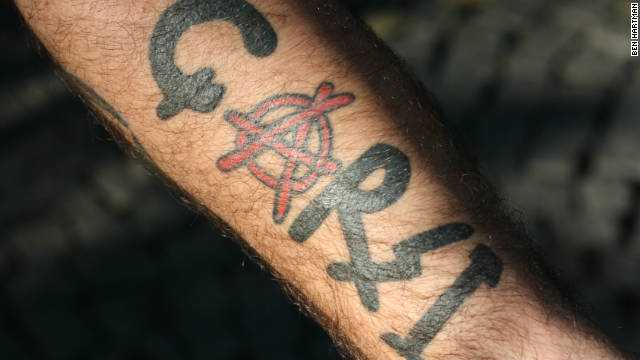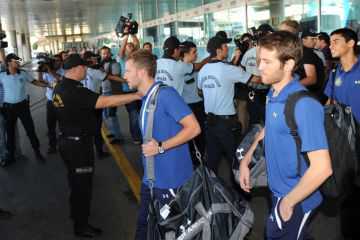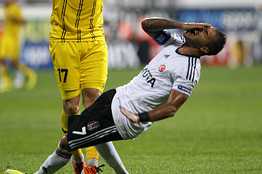
- Clash between football teams from Turkey and Israeli passes peacefully in Istanbul
- There had been fears that Maccabi Tel Aviv’s players and fans would be attacked
- Besiktas supporters insist they have no problem with Israelis, but wanted to win
- Just a dozen Maccabi fans attended the match, played amid rising political tension
Istanbul, Turkey (CNN) — They traveled to Istanbul amid fears that mob violence might erupt as relations between two once-friendly nations turned ugly.
But if Maccabi Tel Aviv and the Israeli club’s supporters received any trouble from the people of Turkey last week, it was only on the football pitch.
After a 5-1 trouncing at the hands of Istanbul’s Besiktas, Maccabi safely returned to Tel Aviv the next day as concerns that the team and its fans would be in danger proved unfounded.
The Europa League match appeared to be a perfect convergence of sports and politics, coming as relations between Israel and Turkey reached an all-time low.
Less than two weeks before the match, Turkish Prime Minister Recep Tayyip Erdogan expelled the Israeli ambassador over the Middle Eastern country’s refusal to apologize for a naval commando raid on the SS Mavi Marmara, on which nine Turkish activists were killed as they made their way to the blockaded Gaza Strip.
Days later, Turkey broke off military ties with Israel — and Jerusalem announced the formation of a naval alliance with Greece, Turkey’s historical enemy.
Erdogan has since threatened to deploy Turkish warships to escort the next Gaza Flotilla and to increase Turkish naval presence in the Eastern Mediterranean to counter Israeli “bullying practices” in the area.
Turkey quickly became a state where Israelis no longer feel welcome, just as Maccabi Tel Aviv headed to Istanbul for a match against a team renowned for having some of the wildest fans in Turkish soccer.
Elif Batuman, a regular contributor to The New Yorker and a writer-in-residence at Koc University, described the Besiktas squad as “the more working-class team.”
“Of the three main Istanbul teams, Besiktas is kind of the underdog. They have the least money, the most run-down stadium,” she said.
“With the other two big Istanbul teams (Galatasaray and Fenerbahce), the stadiums don’t have any particular ties to their neighborhoods, and the fan bases are more spread out. They call themselves the neighborhood team, the people’s team.”
Ahead of a talk on Turkish soccer at an art gallery in central Istanbul the day before the match, Batuman described Besiktas supporters as being tied not only to the neighborhood but also, to some extent, to a political way of life.
Kemal Yuksel
“They’re the most political of the soccer teams: they support Greenpeace, they do blood drives, they’re environmentalists. They’re definitely not pro-American, the ones I’ve talked to, but they say they don’t dislike Americans, only American policy. They are also definitely not pro-Israel and they support the Palestinians.”
He said the match against Maccabi, the most successful club in Israel, was “clearly seen as a rallying event.”
The Israeli media aired reports that Maccabi players who serve in the Israel Defense Forces reserves were banned from taking part in the game out of fear for their safety. The report turned out to be false, but was in keeping with a general sense in Israel that the team was heading straight into the lion’s den at the worst possible moment, prompting calls for the game to be canceled or forfeited.
By mid-afternoon on Thursday, Besiktas fans began pouring into a square in the heart of their neighborhood, a short walk from the stadium. Cheering and downing copious amounts of Efes Pilsen beer, they locked arms and sang about the evils of the hated Fenerbahce and the beauty of all that is Besiktas.
Those Besiktas supporters spoken to at the pre-game drink-up did not appear to have the Gaza Strip or the Mavi Marmara on their minds, and were completely indifferent to the presence of an Israeli reporter scribbling on a notepad in their midst.
Elif Batuman on Besiktas fans
“We hate Fenerbahce, not Israel,” said Kazim, a student from Yildiz Technical University in Istanbul, who also said he did not believe the war of words between the Turkish PM and Netanyahu gave the game any extra meaning.
Kemal Yuksel, a student at the Istanbul Technical University said the Besiktas fans are “just interested in football, not politics.”
“We live for Besiktas and it doesn’t matter what country you’re from — we want to beat you,” he said. “Israel isn’t our problem, it’s the country’s problem. Every Besiktas game is crazy, doesn’t matter if we play Maccabi or anyone else.”
At the same time that the Besiktas fans were pounding pre-game lagers, a crowd of around 200 people marched from Taksim Square in central Istanbul to the Inonu stadium, vowing not to forget or forgive the Mavi Marmara incident. Wearing t-shirts emblazoned with the pictures of the nine Turkish activists and with some protesters carrying flags of the Lebanese Shi’ite militia Hezbollah, they made their way towards the stadium without arrest or incident.
The protest was a repeat of sorts of a smaller gathering held the night before outside the Divan hotel where the Maccabi players were staying. A crowd of about 20 people waving Palestinian flags stood in silence across from the hotel for a couple of hours before filing away into the night.
Meanwhile, a block further down the street past the Divan hotel, three street-walkers of unclear gender plied their wares, drawing slightly more interest from passersby than the nearby anti-Israel protest.
Israel Mukhtar
Like everywhere else the Maccabi players traveled during their visit, the Divan was under heavy police protection. Outside the hotel, two armored police vans were parked at the ready, with officers in front of the vehicles with sub-machine guns. Around a dozen other police officers stood in formation next to the vans, but were not wearing riot gear. Next to the vehicles, a police sedan idled, while a single officer napped in the front seat.
The heightened security continued inside the stadium, where dozens of riot police circled the field and plainclothes police and security officials kept a constant watch on the event.
Once the match kicked off, it took only three minutes for Besiktas forward Hugo Almeida to put his team on the board with the first of his two goals. Maccabi answered soon after halftime through forward Roi Kehane, but the visitors never threatened again and Besiktas rolled to a 5-1 victory before a raucous home crowd.
The 12 hardy Maccabi Tel Aviv fans who attended the game, protected by at least 20 police per head, were seated in the fenced-off visitors’ section, which was book-ended on the left and right by two sections of empty seats patrolled by stadium security.
One of those Israeli fans who made the trip to Istanbul was Israel Mukhtar, 45, who was in town on his first-ever trip abroad with the Maccabi squad.
“We went all around the markets and the nightclubs [in Istanbul] and we told everyone we were Israeli. No-one gave us any trouble whatsoever,” Mukhtar said, adding “all of the security was well done and we never felt a threat for a second, I didn’t even see a single Palestinian flag.”
Mukhtar and his friends, nearly all of whom were middle-aged men who seemed to know each other prior to the trip, said the danger inherent in the match was overblown by the Israeli media.
They praised the professionalism of Turkish security forces, and expressed their feelings that the diplomatic tension between the two countries is on the upper levels of their respective government, and not reflected in a visceral hatred from people on the streets of Turkey’s largest city — as opposed to Cairo, for instance, where a mob ransacked the embassy a week earlier forcing the Israeli staff to flee in drag under evacuation by Egyptian commandos.
Even with the final score of the match reflecting an on-field massacre of the Israeli visitors, Mukhtar said he was not disappointed by his decision to attend the match.
“To be honest, it made me proud to be Israeli. To know that out of 6 million people (in Israel), you’re one of only 12 who was willing to come … I think it means something.”
Ben Hartman is a reporter for the Jerusalem Post.



